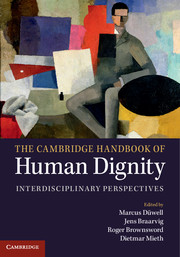Book contents
- Frontmatter
- Contents
- List of contributors
- Foreword
- Why a handbook on human dignity?
- Acknowledgments
- 1 Human dignity from a legal perspective
- 2 Human dignity: concepts, discussions, philosophical perspectives
- Part I Origins of the concept in European history
- 3 Meritocratic and civic dignity in Greco-Roman antiquity
- 4 Human dignity in the Middle Ages (twelfth to fourteenth century)
- 5 Human dignity in late-medieval spiritual and political conflicts
- 6 Human dignity in Renaissance humanism
- 7 The Council of Valladolid (1550–1551): a European disputation about the human dignity of indigenous peoples of the Americas
- 8 Martin Luther's conception of human dignity
- 9 Natural rights versus human dignity: two conflicting traditions
- 10 Rousseau and human dignity
- 11 Human dignity and socialism
- 12 Human dignity in the Jewish tradition
- Part II Beyond the scope of the European tradition
- Part III Systematic conceptualization
- Part IV Legal implementation
- Part V Conflicts and violence
- Part VI Contexts of justice
- Part VII Biology and bioethics
- Appendix 1 Further reading
- Appendix 2 Universal Declaration of Human Rights
- Index
- References
5 - Human dignity in late-medieval spiritual and political conflicts
from Part I - Origins of the concept in European history
Published online by Cambridge University Press: 05 March 2015
- Frontmatter
- Contents
- List of contributors
- Foreword
- Why a handbook on human dignity?
- Acknowledgments
- 1 Human dignity from a legal perspective
- 2 Human dignity: concepts, discussions, philosophical perspectives
- Part I Origins of the concept in European history
- 3 Meritocratic and civic dignity in Greco-Roman antiquity
- 4 Human dignity in the Middle Ages (twelfth to fourteenth century)
- 5 Human dignity in late-medieval spiritual and political conflicts
- 6 Human dignity in Renaissance humanism
- 7 The Council of Valladolid (1550–1551): a European disputation about the human dignity of indigenous peoples of the Americas
- 8 Martin Luther's conception of human dignity
- 9 Natural rights versus human dignity: two conflicting traditions
- 10 Rousseau and human dignity
- 11 Human dignity and socialism
- 12 Human dignity in the Jewish tradition
- Part II Beyond the scope of the European tradition
- Part III Systematic conceptualization
- Part IV Legal implementation
- Part V Conflicts and violence
- Part VI Contexts of justice
- Part VII Biology and bioethics
- Appendix 1 Further reading
- Appendix 2 Universal Declaration of Human Rights
- Index
- References
Summary
Human dignity in the late Middle Ages: mysticism and the law of nations
Recently, medievalists have started to address the question of individuality in the Middle Ages. They broadly agree that Leopold von Ranke, Jakob Burkhardt and others were misguided in understanding the Renaissance as a break with the dark medieval collectivism. The same holds – to an extent that is yet to be determined – for the understanding and justification of human dignity. In the Middle Ages, a number of perspectives arise that break ground for the idea of dignity and equality between humans. At the same time, though, there are numerous medieval approaches that vigorously challenge such ideas.
The Church Fathers connected the ancient idea that human beings have a special place in the world because of their rational capacities and their ability for self-formation (the Stoics, Cicero), with the Christian doctrine of the human being as created in the image of God (imago Dei) or the redeemed (baptized) human as similar to God (similitudo). That is, by participating in God in being His image, human beings at the same time participate in God's reason. Humans have the capacity to reflect on themselves, and to exercise free will (liberum arbitrium). The particular theory of human dignity as springing from freedom – especially the individual's freedom of the will and his capacity for self-determination and self-knowledge – does not (as is often assumed) originate from Pico della Mirandola's work, De hominis dignitate, but can already be found in Alcuin of York's De dignitate conditionis humanae (cf. Marenbon 1981), as well as in several twelfth-century texts. Peter Abelard develops an account of the will as a reflexive structure and the unity of human beings as rational creatures. The ‘I’ in this theory – the conscious and reflexive relation of people to their own will – is determined by rationality, which humans employ to evaluate possible actions and to decide to act in a particular way. Yet such a secundum rationem agere was already identified by Pseudo-Dionysus as the ethical capacity of the human being; one that is not only a form of freedom, but also a responsibility.
- Type
- Chapter
- Information
- The Cambridge Handbook of Human DignityInterdisciplinary Perspectives, pp. 74 - 84Publisher: Cambridge University PressPrint publication year: 2014
References
- 5
- Cited by



